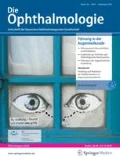Zusammenfassung
Hintergrund
Weltweit stammt ein Großteil aller sehbehinderten Menschen aus Ländern mit niedrigem oder mittlerem Einkommen. Ursächlich hierfür ist unter anderem ein Mangel an Augenärzten in den betreffenden Ländern. Eine Abwanderung von qualifiziertem Personal würde die augenärztliche Patientenversorgung zusätzlich erschweren.
Ziele
Ziele dieser Untersuchung sind eine Evaluation der Einstellung afrikanischer Assistenzärzte zu einer beruflichen Tätigkeit im Heimatland bzw. einer möglichen Migration und ein Vergleich mit den vorhandenen Daten auch im Hinblick auf Interventionsmöglichkeiten.
Methodik
Mithilfe eines Fragebogens wurden in den Jahren 2016 und 2017 Teilnehmer augenärztlicher Weiterbildungskurse für Assistenzärzte in Daressalam (Tansania) und Addis Abeba (Äthiopien) sowie Assistenzärzte in Moshi (Tansania) zu einer möglichen Auswanderung befragt.
Ergebnisse
Es wurden insgesamt 60 Fragebögen ausgewertet. Hauptgründe, im Heimatland zu bleiben, waren: „Wille, den eigenen Leuten zu helfen“, „familiäre Bindungen“ sowie „hoher Bedarf an Fachkräften“. Hauptmotive für eine mögliche Auswanderung waren: „besseres Einkommen“, „bessere Arbeitsbedingungen und Klinikausstattung“ und „bessere Weiterbildungsmöglichkeiten“.
Diskussion
Kooperationen zwischen deutschen und afrikanischen Augenkliniken, so wie sie beispielsweise von der Sektion Internationale Ophthalmologie der Deutschen Ophthalmologischen Gesellschaft (DOG) und dem Deutschen Komitee zur Verhütung von Blindheit (DKVB) unterstützt werden, können einen Beitrag dazu leisten, einige Hauptgründe für die Migration von Fachkräften wie schlechte Weiterbildungsmöglichkeiten, Arbeitsbedingungen und Klinikausstattung zu verbessern und damit einer Abwanderung entgegenzuwirken.
Abstract
Background
Globally, the majority of visually impaired persons live in low- and middle-income countries. One of the reasons is a lack of ophthalmologists in the respective countries. Migration of qualified personnel would be an additional strain on ophthalmological patient care.
Objective
This analysis aimed at evaluating the attitude of African residents in ophthalmology towards working in their home country or migrating abroad and comparing these findings with existing data also with respect to possible interventions.
Material and methods
In 2016 and 2017, participants of ophthalmological training courses for residents in Dar es Salaam (Tanzania) and Addis Ababa (Ethiopia) as well as residents from Moshi (Tanzania) were interviewed on possible migration with the help of a questionnaire.
Results
In total 60 questionnaires were analyzed. The main reasons for staying in the home country were: “want to support/serve community”, “family” as well as “high demand of specialists”. Prime motives for possible migration were: “better income”, “better working structure/equipment” and “better education”.
Conclusion
Links between German and African eye hospitals as they are supported, for example by the working group International Ophthalmology of the German Ophthalmological Society (DOG) and the German Committee for the Prevention of Blindness (DKVB), can contribute to improve some of the main reasons of migration, such as insufficient education, working structures and equipment and thus help to prevent a brain drain.
Literatur
Bourne RRA, Flaxman SR, Braithwaite T et al (2017) Magnitude, temporal trends, and projections of the global prevalence of blindness and distance and near vision impairment: a systematic review and meta-analysis. Lancet Glob Health 5:e888–e897
Derbew M, Laytin AD, Dicker RA (2016) The surgical workforce shortage and successes in retaining surgical trainees in Ethiopia: a professional survey. Hum Resour Health 14:29
Duvivier RJ, Burch VC, Boulet JR (2017) A comparison of physician emigration from Africa to the United States of America between 2005 and 2015. Hum Resour Health 15:41
Flaxman SR, Bourne RRA, Resnikoff S et al (2017) Global causes of blindness and distance vision impairment 1990–2020: a systematic review and meta-analysis. Lancet Glob Health 5:e1221–e1234
http://atlas.iapb.org. Zugegriffen: 20. Dez. 2017
http://atlas.iapb.org/Global-Action-Plan/Gap-Indicators/#Data-Used. Zugegriffen: 20. Dez. 2017
http://cehc.lshtm.ac.uk/Clinical-Fellows/. Zugegriffen: 20. Dez. 2017
http://www.icoph.org/refocusing_education/fellowships.html. Zugegriffen: 20. Dez. 2017
Kasper J, Bajunirwe F (2012) Brain drain in sub-Saharan Africa: contributing factors, potential remedies and the role of academic medical centres. Arch Dis Child 97:973–979
Lewallen S, Etya’ale D, Kello AB et al (2012) Non-physician cataract surgeons in Sub-Saharan Africa: situation analysis. Trop Med Int Health 17:1405–1408
Mavrakanas N, Dhalla KA, Jecha J et al (2016) Results and safety profile of trainee cataract surgeons in a community setting in East Africa. Indian J Ophthalmol 64:818–821
Nentwich MM, Klauss V, Wilhelm F (2015) Arbeiten im Heimatland oder an Auswandern Denken: Fragebogenbasierte Studie mit afrikanischen Augenärzten. Ophthalmologe 112:429–434
Nentwich MM, Schaller UC, Klauss V (2014) Reasons reported by African ophthalmologists for staying in Africa and for considering migrating. Int Ophthalmol 34:887–892
Silvestri DM, Blevins M, Afzal AR et al (2014) Medical and nursing students’ intentions to work abroad or in rural areas: a cross-sectional survey in Asia and Africa. Bull World Health Organ 92:750–759
Tankwanchi AB, Vermund SH, Perkins DD (2015) Monitoring Sub-Saharan African physician migration and recruitment post-adoption of the WHO code of practice: temporal and geographic patterns in the United States. PLoS ONE 10:e124734
WHO (2013) Universal eye health: a global action plan 2014–2019
WHO (2010) The WHO global code of practice on the international recruitment of health personnel
Danksagung
Ein herzlicher Dank gebührt der Deutschen Ophthalmologischen Gesellschaft für die Unterstützung im Rahmen der Forschungsförderung Tropenophthalmologie.
Author information
Authors and Affiliations
Corresponding author
Ethics declarations
Interessenkonflikt
K.M. Knoll, H. Philippin, W. Makupa und M.M. Nentwich geben an, dass kein Interessenkonflikt besteht.
Dieser Beitrag beinhaltet keine von den Autoren durchgeführten Studien an Menschen oder Tieren.
Additional information
Diese Arbeit wurde in Teilen auf dem 117. Kongress der Deutschen Ophthalmologischen Gesellschaft 2017 in Berlin im Rahmen einer freien Vortragssitzung vorgestellt.
Rights and permissions
About this article
Cite this article
Knoll, K.M., Philippin, H., Makupa, W. et al. Auswandern – eine Option für afrikanische Assistenzärzte?. Ophthalmologe 116, 357–363 (2019). https://doi.org/10.1007/s00347-018-0690-4
Published:
Issue Date:
DOI: https://doi.org/10.1007/s00347-018-0690-4
Schlüsselwörter
- Abwanderung von Fachkräften
- International graduierte Mediziner
- Migration
- Öffentliches Gesundheitswesen
- Medizinische Weiterbildung

